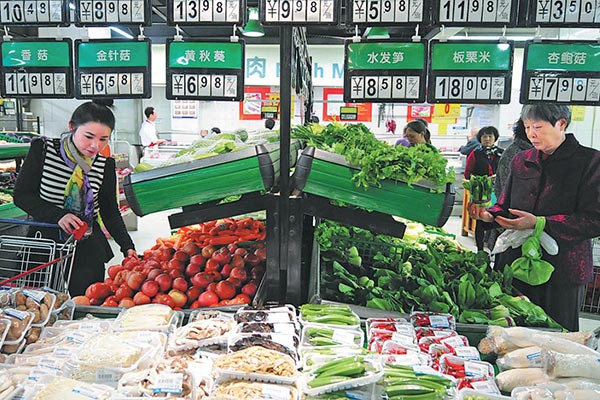
Customers shop for vegetables in a supermarket in Jiujiang, Jiangxi province, on Oct 14.[Photo by Hu Guolin/China Daily]
Consumption is the major economic driver, showing the nation’s success in rebalancing the economy, but more efforts are needed to sustain growth, with heightened pressure in sectors with overcapacity, economists said.
“China is on the right path of economic rebalancing as consumption contributes a high proportion to economic growth, with both the structure and quality improved,” said Sheng Laiyun, spokesman for the National Bureau of Statistics, on Oct 19.
Consumption contributed 71 percent of economic growth in the first three quarters, up by 13.3 percentage points compared with the same period last year, NBS data showed on Oct 19.
Retail sales of consumer goods grew by 10.4 percent year-on-year in the first three quarters, slightly higher than the 10.3 percent growth in the first half.
The growth was largely fueled by rising consumer demand for automobiles, telecommunications products, food, clothing and other commodities, according to Xie Yaxuan, chief economist at China Merchants Securities Co.
In September, consumption rose by 10.7 percent year-on-year, up by 0.1 percentage point compared with last month and the highest monthly growth this year.
Xie said he believed consumption will continue growing, with demand for high-end products expected to increase. However, he added, maintaining growth momentum is cause for concern, since personal income growth has been slowing.
Per capita disposable income in the first three quarters grew by 6.3 percent, down by 0.2 percentage points from the first half of the year.
Although slower income growth is a natural result of economic restructuring as the nation deals with overcapacity, it shows how the labor market is facing heightened pressure, said Zhao Xijun, an economics professor at Renmin University of China.
Niu Li, director of macroeconomics at the State Information Center, said the government needs to help create more jobs. “That can be quite challenging at a time when demand for investment, despite some signs of an uptick, has yet to stabilize,” he said.
